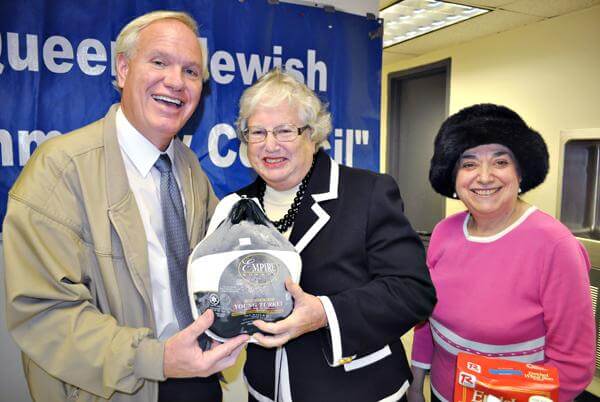By Joe Anuta
Hungry people celebrate holidays, too, especially after Cynthia Zalisky of the Queens Jewish Community Council gave out nearly 56 kosher turkeys on Nov. 17 to combat Forest Hills’s growing hunger problem.
“We are giving the turkeys to the neediest and the largest families” said Zalisky, who added that the council operates across Queens and by her count boroughwide hunger has increased by 30 percent from 2009.
On Tuesday, several emergency food agencies, including the New York Coalition Against Hunger, Food Bank NYC and the Human Resources Administration, reported that hunger in Queens has been on the rise since last year.
And Zalisky has the numbers to back up the agencies’ claims.
In October 2008, the council served 649 people. In October 2009, it served 982, an increase of 51 percent. In October of this year, the council served 1,443 people, another increase of 47 percent and more than double the number of people from two years ago.
Now the council, at 119-45 Union Tnpk., serves an average of 1,300 individuals or families a month by providing them with kosher meals, meals-on-wheels and non-perishable foods. The council also provides cultural programs and other social services to the community. But booming business means hard times for the neighborhood.
“We’ve seen a change, and it’s not positive,” she said. “It is heartbreaking.”
Out of the 1,443 people who visited the pantry in October, 413 were children, 550 adults and 480 seniors.
Zalisky said the numbers of seniors has nearly doubled since last year and she has accommodated the increase largely through her Meals on Wheels program since many of the elderly cannot leave their homes.
She has seen another surprising increase as well. More of the working poor — people or families who make too much money to qualify for government programs but cannot sustain themselves — are showing up at her door, many for the first time in their lives.
“We call them the near poor,” Zalisky said. “They’re not entitled to entitlements.”
Shame or embarrassment often prevented these people from coming before, but Zalisky said there is a breaking point for everybody.
“There comes a point where you have to forget about pride,” she said. “They have to pay the bills.”
In the coming weeks, Food Bank New York City and the New York City Coalition Against Hunger plan to release new statistics about the city’s hungry population, and Zalisky is not optimistic.
“Demand has not ebbed,” she said. “It is worse.”
Both Food Bank NYC and the NYC Coalition Against Hunger, along with another organization called City Harvest, have been instrumental in keeping Zalisky’s pantry functioning over the years by supplying it with food. Times are especially tough during the holidays when children are not eating at school, and Zalisky hopes that the cash-strapped government realizes how much good the organizations do.
“We hope they won’t cut funding to the food bank,” Zalisky said. “We’re struggling to keep our pantries open.”
The problem is not just in New York, either. ABC News reported last week that nationwide one in four families is enrolled in a government food program.
“This is America,” Zalisky said in disbelief. “The richest country in the world.”
Reach reporter Joe Anuta by e-mail at januta@cnglocal.com or by phone at 718-260-4566.


































